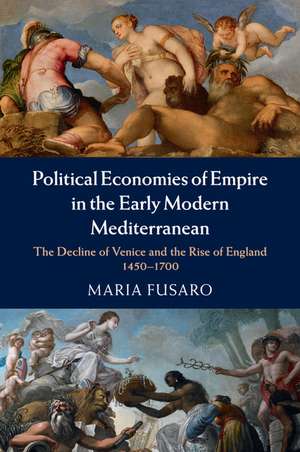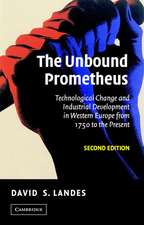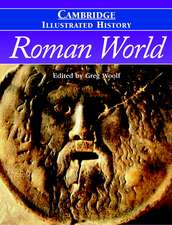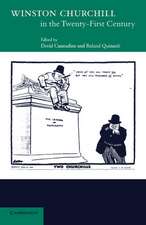Political Economies of Empire in the Early Modern Mediterranean: The Decline of Venice and the Rise of England, 1450–1700
Autor Maria Fusaroen Limba Engleză Paperback – 15 mar 2017
Preț: 324.62 lei
Nou
Puncte Express: 487
Preț estimativ în valută:
62.12€ • 67.68$ • 52.34£
62.12€ • 67.68$ • 52.34£
Carte tipărită la comandă
Livrare economică 23 aprilie-07 mai
Preluare comenzi: 021 569.72.76
Specificații
ISBN-13: 9781107630383
ISBN-10: 110763038X
Pagini: 436
Ilustrații: 6 b/w illus. 2 maps
Dimensiuni: 153 x 230 x 24 mm
Greutate: 0.58 kg
Editura: Cambridge University Press
Colecția Cambridge University Press
Locul publicării:New York, United States
ISBN-10: 110763038X
Pagini: 436
Ilustrații: 6 b/w illus. 2 maps
Dimensiuni: 153 x 230 x 24 mm
Greutate: 0.58 kg
Editura: Cambridge University Press
Colecția Cambridge University Press
Locul publicării:New York, United States
Cuprins
Introduction: political economies of empire; 1. The medieval background; 2. The reversal of the balance; 3. The Ottoman Levant; 4. Genoa, Venice and Livorno (a tale of three cities); 5. Trade, violence and diplomacy; 6. Diplomacy, trade and religion; 7. The Venetian peculiarities; 8. The English mercantile community in Venice; 9. The English and other mercantile communities; 10. The goods of the trade; 11. Empires and governance in the Mediterranean; 12. Coda and conclusions; Bibliography; Index.
Recenzii
'Two empires, Venice already old and past its peak, England adolescent and ambitious, met in mingled rivalry and co-operation in the early modern Eastern Mediterranean. English-speaking historians have long regarded the Venetian Empire as a maritime empire prefiguring the British Empire, but their view of Venice and its transactions with England has generally been based on English sources. For the first time Maria Fusaro gives us the English among the creeks and islands of the Venetian empire, as seen by the Venetians themselves. Using archives hitherto little-known or wholly unknown, she paints a lively picture of Anglo-Venetian commerce, diplomacy and war.' Nicholas Rodger, University of Oxford
'This is an innovative work of comparative history that makes a significant contribution to our understanding of the early modern world. By considering the rise of England and the decline of Venice in tandem, Fusaro is able to cast fascinating new light onto these familiar historical questions, and to show their importance to broader issues, such as the rise of capitalism, globalization and empire.' Eric Dursteler, Brigham Young University, Utah
'Fusaro is determined to remind her readers, contrary to mainstream historiography, that Venice was indeed an empire and one whose imperial glories, preoccupations and costs acted as a model to those capitalist successors which have lasted into the twentieth century and beyond.' Richard Bosworth, History Today
'Every scholar interested in imperial history and the English mercantile community should read Political Economies of Empire in the Early Modern Mediterranean as Maria Fusaro proposes a stimulating re-interpretation of the role of Venice and the English within the early modern Mediterranean. This book is an excellent response to the quantitative-econometric approach now unfortunately too common among economic historians that, by overlooking the social aspect of commerce, fail to grasp fully the early modern maritime world. Instead, Fusaro's work enriches recent literature on social history of trade … Fusaro presents a novel view on imperialism and a different narrative on trade that I hope economic historians will develop in future scholarship.' Giada Pizzoni, Global Intellectual History
'Fusaro explores this complex of issues through a dense, source-rich analysis of the commercial, diplomatic, and social links between Venice and England from the late Middle Ages through the seventeenth century.' Dennis Romano, The Journal of Modern History
'Political Economies offers much to a broad range of readers. Those interested only in Venice will garner a new understanding of her political and economic history, especially for those to whom Italian historiography has been inaccessible. Scholars interested in the rise of England will also find much that is new in this book (although its primary research into English sources is much less rich than the evidence of Italian archives). For economic and political historians, Fusaro has revealed a concrete example of the interplay between politics, trade, economics and warfare. Of course readers in any of those camps may well be maritime historians, all of whom will find this book a valuable contribution to our expanding range of interest. As its title implies, Political economies of empire in the early modern Mediterranean is very much a maritime history, too.' Adrian Leonard, The International Journal of Maritime History
'The volume of research initiated for the production of this book is impressive, and has enabled Fusaro to create an imposing study that will prove vital for the early modern maritime historian. … The book is a valuable and authoritative contribution to the fields of early modern state formation, maritime studies, and economic history.' Benjamin W. D. Redding, The Mariner's Mirror
'This is an innovative work of comparative history that makes a significant contribution to our understanding of the early modern world. By considering the rise of England and the decline of Venice in tandem, Fusaro is able to cast fascinating new light onto these familiar historical questions, and to show their importance to broader issues, such as the rise of capitalism, globalization and empire.' Eric Dursteler, Brigham Young University, Utah
'Fusaro is determined to remind her readers, contrary to mainstream historiography, that Venice was indeed an empire and one whose imperial glories, preoccupations and costs acted as a model to those capitalist successors which have lasted into the twentieth century and beyond.' Richard Bosworth, History Today
'Every scholar interested in imperial history and the English mercantile community should read Political Economies of Empire in the Early Modern Mediterranean as Maria Fusaro proposes a stimulating re-interpretation of the role of Venice and the English within the early modern Mediterranean. This book is an excellent response to the quantitative-econometric approach now unfortunately too common among economic historians that, by overlooking the social aspect of commerce, fail to grasp fully the early modern maritime world. Instead, Fusaro's work enriches recent literature on social history of trade … Fusaro presents a novel view on imperialism and a different narrative on trade that I hope economic historians will develop in future scholarship.' Giada Pizzoni, Global Intellectual History
'Fusaro explores this complex of issues through a dense, source-rich analysis of the commercial, diplomatic, and social links between Venice and England from the late Middle Ages through the seventeenth century.' Dennis Romano, The Journal of Modern History
'Political Economies offers much to a broad range of readers. Those interested only in Venice will garner a new understanding of her political and economic history, especially for those to whom Italian historiography has been inaccessible. Scholars interested in the rise of England will also find much that is new in this book (although its primary research into English sources is much less rich than the evidence of Italian archives). For economic and political historians, Fusaro has revealed a concrete example of the interplay between politics, trade, economics and warfare. Of course readers in any of those camps may well be maritime historians, all of whom will find this book a valuable contribution to our expanding range of interest. As its title implies, Political economies of empire in the early modern Mediterranean is very much a maritime history, too.' Adrian Leonard, The International Journal of Maritime History
'The volume of research initiated for the production of this book is impressive, and has enabled Fusaro to create an imposing study that will prove vital for the early modern maritime historian. … The book is a valuable and authoritative contribution to the fields of early modern state formation, maritime studies, and economic history.' Benjamin W. D. Redding, The Mariner's Mirror
Notă biografică
Descriere
Early modern European economic development seen through the interaction of two major players in the Mediterranean economy: Venice and England.












